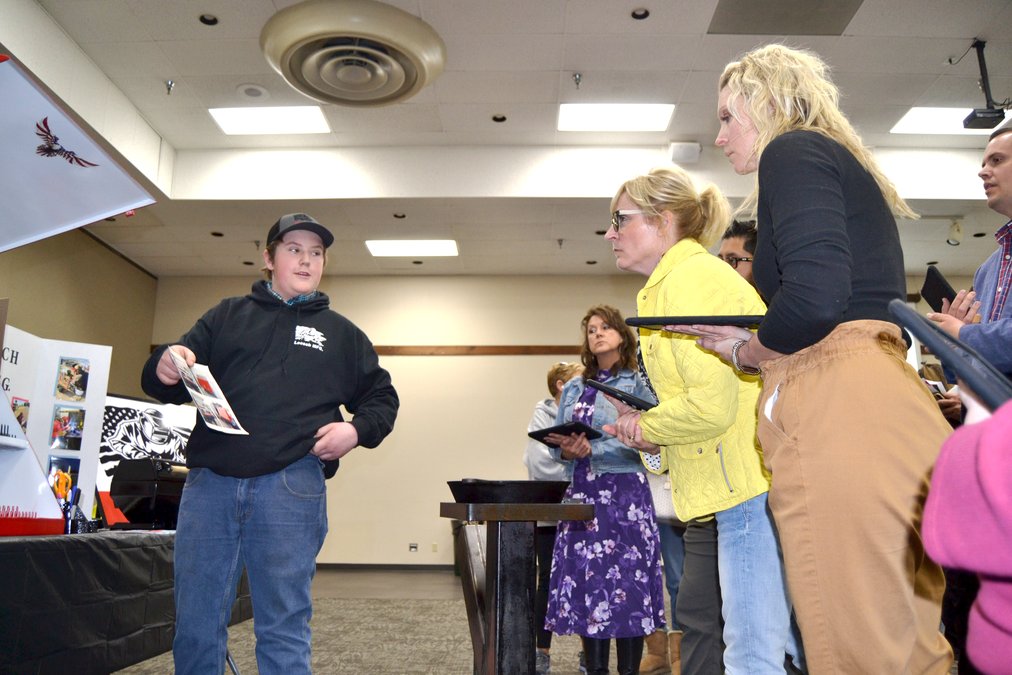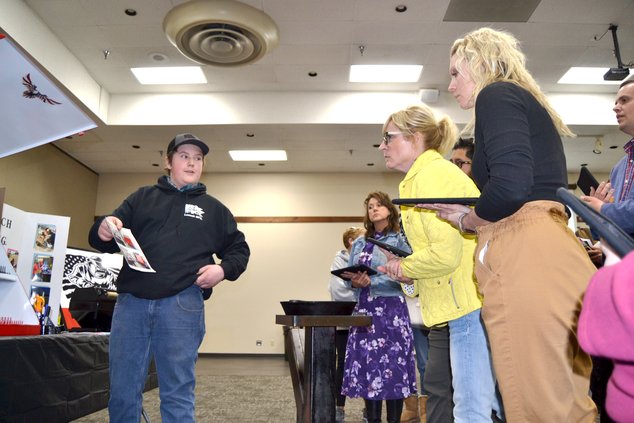Though in the end a champion defended her crown, all four students who competed in the second Barton County Youth Entrepreneurship Challenge Tuesday at the Great Bend Events Center emerged from the event as winners.
The four students – Kiley Stevenson, a junior at Ellinwood High School, Bradley Hopkins, Great Bend High School junior, Hoisington High School freshman Tucker Loesch, and Great Bend High School junior Jordan Clair – all showcased their entrepreneurial spirit for a panel of judges made up of local and state business and government leaders. The panel included Christy Preston of NetWork Kansas, Great Bend city council member and business owner Davis Jimenez, Lori Waters with Main Street Media, Reid Petty, a member of 1st District U.S. Rep. Tracey Mann’s office, Jessica Milsap with MPIRE Realty, and local businesswoman Sheryl Cheely.
All four students offered detailed business presentations to the judges during the 90-minute trade show style challenge, as well as fielding questions about their businesses from both the judges and members of the community who attended Tuesday afternoon’s challenge.
As part of those presentations to judges, the four students shared with the judges the ideas and motivations behind their business visions, and how they planned to make those visions a practical reality. Judges’ questions for the participants included such real-world business problems as start-up costs, material sourcing, long-term business goals and marketing plans.
At the end of the competition, the panel awarded Stevenson the $1,000 first-place prize with her baking business, Kiley’s Creations, for a second year in a row. Even though she won the event last year, Stevenson returned to the competition with the hopes of continuing to learn and gaining more valuable experience.
“I just I had a lot of fun last year and I learned a lot,” she said. “It was really nice to see that I was capable of this and I knew that I had potential with my business.”
This year, she hoped to show how last year’s experience helped her grow as a businessperson. Last year, she said, she felt intimidated by the experience, but because of it was able to come into this year with more confidence.
“I know how to handle (better) the questions being thrown at me, and I’m able to talk about how I’ve grown in one year and what’s changed,” she said.
Among those changes is a more formulated long-term goal of not just being a home baker, but opening a brick and mortar storefront downtown in her hometown of Ellinwood.
Hopkins, a fellow second-year competitor, after presenting a woodworking business last year opted for a new direction this year as he presented his welding business, Hop’s Welding. This spirit of learning from past experiences and being willing to try something new impressed organizers enough to award him a previously-unplanned Entrepreneurial Spirit award.
Now a junior, Hopkins said he fell in love with welding after taking a class during his freshman year at GBHS.
“I really liked because I can be creative with it, and I can make whatever I want to, pretty much, with my resources,” he said, describing to judges how he takes sourced scrap metal and turns it into detailed artistic pieces both large and small.
He made the decision to pursue a new business this year after seeing in a wider market for the welding pieces than with his woodworking business. After he started welding, he said, he had several requests from friends and a teacher to both make and purchase pieces, and saw an opportunity to create a business from it.
His business model, he said, is to make pieces that are high-quality and completely customizable, and can cost anywhere from about $3 to $300 to create, depending on the cost of the materials needed.
Tucker Loesch, took home both second place overall, and the community-voted People’s Choice Award, for his welding business, Loesch MFG,
His passion for welding began at the age of 10 after working with his father, and has expanded since his father, also previously a welder, had to stop welding after getting a pacemaker.
The elaborate pieces he presented judges included a large grill he adapted into a cold-smoker after the grill quit working, and a “rocket stove,” a narrow diagonal metal tube that use gravity to feed coal, heat and flame up through a second vertical tube to a fabricated stove-top. Loesch also presented an elaborate tool box, a piece he said took him about 15 hours to create. In addition to creating pieces like what he presented to the judges, Loesch also said he has helped work on fences and corrals around the area.
With about five years experience already under his belt, he hopes to take the continuing experience and turn it into a career down the road as he gains more experience.
First-time competitor Jordan Clair from GBHS took home third place with a product concept built on a passion for renewable energy and environmental consciousness.
The idea to turn household trash into a practical home energy producer originated in eighth grade when a science teacher challenged his class to design a reliable renewable home energy source that was environmentally friendly. In that process, Clair said he drew on an idea already popular in European countries such as Denmark to use recycled trash to produce energy instead of allowing it to pile up in landfills.
Though some governments already use the concept on a large scale, Clair hopes to engineer it on a more personal scale, with the hope that one day people will be able to take their household garbage and use it to produce energy for their homes.
The concept is a compartmented design which uses heat from burning trash to heat water into steam. The steam would combine with the smoke from the fire to turn a small turbine which will produce an electric charge to charge a battery in an insulated concrete battery box, and the battery will ultimately produce energy for the household. The ash, or charcoal, produced from the fire, he said, would also have multiple renewable uses including agricultural and household products. The device would remove toxins from the ash and smoke through a series of filters contained within the device.
Though it is still currently a theoretical concept, Clair said current environmental concerns and demand for renewable energy sources would make it a viable product in the future.
Growing for the future
Having already seen the YEC grow from the first to the second year, Great Bend Chamber of Commerce director Megan Barfield is proud to see the event grow with four-high quality contestants this year.
“I am super impressed,” Barfield said. “I just think it’s neat to see these kids stand there and hold their own, they’ve got that confidence, I think it shows a lot for their age.”
Great Bend Economic Development Director Sara Hayden said it’s impressive to see the massive amount of work the students put in to turn their business ideas into reality.
“In economic development, one of our missions is to really support entrepreneurship, I think that starts even at a high school level. So it’s great to get these things out there and show people just what the students are dreaming up and what they can accomplish,” Hayden said.
With increasing awareness of the event, organizers have been able to get more members of the local business community involved, which Barfield also feels is a positive sign for the event’s future.
“Each year, we’re going to keep growing it with hopes of one year expanding it to middle-schoolers,” Barfield said. “So I think that’ll be fun, because those kids have a completely different view of things (than high school students).”
For now, she said, she’s glad to help the budding entrepreneurs be able to see the resources that are available in their own community, and give them a chance to network those resources.
“It starts their wheels turning, like, ‘Oh my gosh, this could be a viable business, not just a hobby while I’m in school,’” Barfield said.





